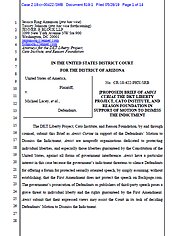Learn more about Cato’s Amicus Briefs Program.
Backpage was a website that allows third-party users to post classified ads. Unsurprisingly, advertisements for adult services made up a portion of these posts—adult content tends to end up on websites that don’t have strict content guidelines. Although the site allowed adult content, Backpage has been instrumental in reporting criminal activities to law enforcement over the years. Apparently, this did not buy the site any good will with Uncle Sam, as federal agents raided the homes of Michael Lacey and James Larkin, the founders of Backpage. The two were subsequently indicted for facilitating prostitution and conspiracy, even though they never communicated with anyone in a prostitution ring. Lacey and Larkin spent over a week in jail before finally being released on bond. The government has frozen their assets and is attempting to seize what little they have left (Cato previously filed a brief in the case challenging the attempted civil forfeiture of Lacey and Larkin’s publishing assets).
Prior to being indicted, Lacey and Larkin believed that they were safe from legal action on constitutional grounds. The First Amendment provides broad protection to various forms of speech, including sexually explicit speech. Section 230 of the Communications Decency Act also protects digital platforms that indiscriminately publish material, as Backpage does, distinguishing the people who operate a website from those who choose to speak on that site. Speakers are thus liable for their own speech, but third parties are not.
Although ads for prostitution or sex trafficking are not protected speech, the government overplayed its hand by presuming that the First Amendment does not protect the adult content on Backpage. While the ads in question may fall outside of constitutional protection, the Supreme Court has held that the government must prove, not merely assume, that speech is unprotected. It has also established that sexually explicit speech that appears to be potentially unlawful is nevertheless presumptively protected. The government can, of course, defeat that presumption, but the government has to prove it, not just say it.
Furthermore, the government has failed to establish that Lacey and Larkin had the degree of knowledge or intent required for a speech-related prosecution. The government alleges that the two were generally aware of the allegedly illegal content on their website, but, when speech is involved, the First Amendment demands that the government prove something beyond mere general awareness. It must demonstrate that Lacey and Larkin were specifically aware of the illegal content on their website, or that they intended to engage in illegal behavior. It is unlikely that the government can meet such a burden of proof in this instance.
Cato has joined The DKT Liberty Project and Reason Foundation in filing an amicus brief in support of Backpage’s founders, asking the federal district court to dismiss the indictment. Here, the government has attempted to thwart the protections granted under the First Amendment in order to more easily obtain an indictment. The federal government has a legitimate interest in enforcing federal law, and stopping human trafficking is an admirable goal. However, the government does not need to trample on constitutional protections to achieve that end, nor should it.

This work is licensed under a Creative Commons Attribution-NonCommercial-ShareAlike 4.0 International License.
